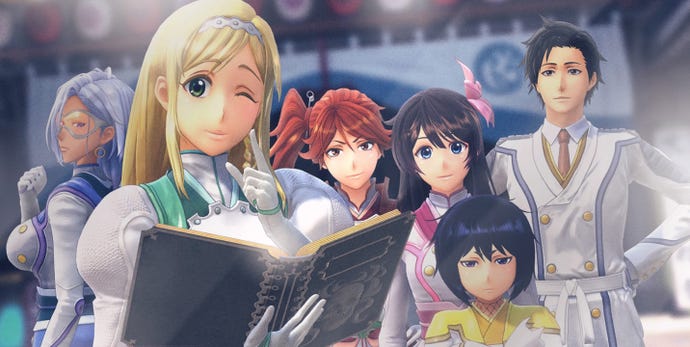Sakura Wars Review: Anime Tropes and Romance in Abundance
Sakura Wars' reboot revives mech combat and incredibly uncomfortable romances.
This article first appeared on USgamer, a partner publication of VG247. Some content, such as this article, has been migrated to VG247 for posterity after USgamer's closure - but it has not been edited or further vetted by the VG247 team.
If you love anime, you probably know all the tropes. You're bound to run into a cool teenage protagonist with supreme physical strength; a girl who's tough on the outside but actually quite fancies the aforementioned protagonist, or breasts incapable of being supported by a natural human spine. Sakura Wars is home to all these concepts, and so many more.
As protagonist Seijuro Kamiyama, you are the aforementioned smooth-talking, impossibly knowledgeable commander. Placed in charge of a failing Imperial Combat Revue theatre troupe, it's your job to turn their fortunes around with zero prior knowledge, all while defending 1940's Tokyo using giant mechs.
Sakura Wars is the first new entry in the venerable series since 2010. A favorite of import fans in North America, Sakura Wars got its start on the Sega Saturn in 1996, eventually growing into a veritable media empire encompassing TV, films, live shows, and even a themed cafe. Sakura Wars subsequently withered in the 2010s, but it's back now in a rebooted form, with a delightful cast of characters propelling a charming JRPG adventure.
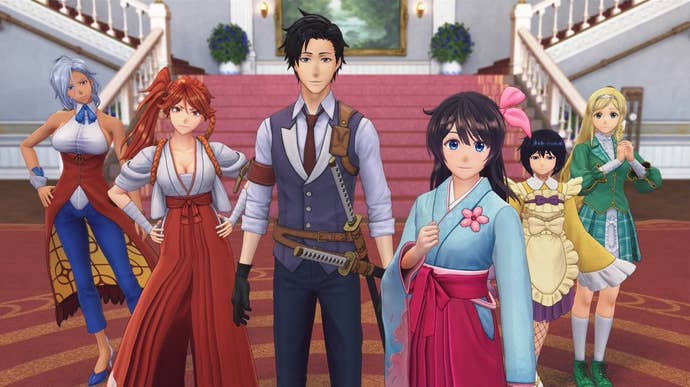
At heart, Sakura Wars is basically an interactive visual novel, mixing dating sim elements with hack-and-slash combat. When you're not battling the forces of the underworld, you'll spend your downtime helping members of the theatre troupe to overcome their personal and professional struggles, all while trying to restore the theatre back to its former glory. When Tokyo's demon sirens—yes, they're a thing—ring out, Seijuro and company jump into their mechs, harnessing cutting-edge technological prowess to obliterate demons with swords and spells. I have no clue how the all-female theatre troupe finds time to save a city while still having time for rehearsal, but since when has anime ever been logical?
All five members of the theatre troupe start out cagey and, in some cases, combative towards you. Your job as their commander is to break down the walls they've erected by getting to know them, and crucially, selecting the right dialogue options for the right situations. There's even a gauge in the menu systems of Sakura Wars that lets you know how close you are to each of the girls, tracking their progress towards their ultimate goal: you. In short, Sakura Wars is really one massively horny anime harem sitcom.
To wit, there's a running joke that Seijuro is a massive pervert: he finds girls' underwear left around the theatre, frequently has the opportunity to spy on them, and generally does his best to examine their figures in any given conversation. Seijuro is a pervert whether you voluntarily take the opportunity to snoop on girls in the bath or not. But at the same time, he's also the absolute blandest of anime protagonists around, with minimal emotion and lackluster convictions, making him vastly inferior to the characters he attempts to romance at every turn.
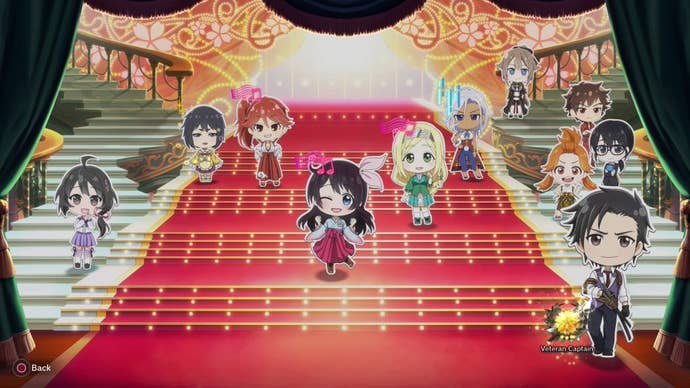
Sakura, Hatsuho, Azami, Clarissa, and Anastasia, on the other hand, are bursting with personality, with each getting a chapter dedicated to exploring their character. For example Sakura aspires to the heights of her idol (and former series character) Sakura Shinguji, and Azami hails from a secret tribe of ninjas, adopted by them after her parents died. They're all fun in their own unique way, but they also feel unfortunately one-note, and the relentlessly simple charm can wear thin after a while. Azami reiterating the rules of her ninja village definitely wears out its welcome after the hundredth time.
Their dedicated chapters should be a great opportunity for character growth, but it all feels a little too brief: you'll spend a few hours in a chapter adventuring around steampunk Tokyo with one of the girls, uncovering their past, motivations, and any insecurities. After that, you're whisked away to battle demonic forces encroaching on the city, rounding out the chapter. Through this, you'll grow closer and closer to them, culminating in a special 'Trust' event. The camera switches to first-person, and you'll shower them with compliments and cheesy romantic lines.
These events are excruciating. You're provided with a cursor with which to scan each girl as they face you, picking out distinct features that you can compliment them on. "Your eyes are dazzling," proclaims Seijuro to Clarissa in one scenario among other cheap lines. The Trust events are uncomfortable because they have you scanning the girls like an object, examining them to pick out interesting details that you can comment on. Each storyline for every member of the Imperial Combat Revue revolves around these romances, and the goal is always the same: analyze every part of them to execute the perfect compliment and ultimately seduce them.
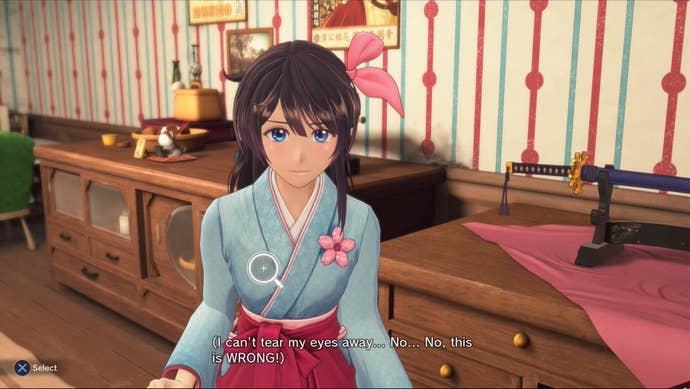
It all winds up feeling hollow, not to mention creepy. It's a crying shame there's relatively sparse character development for each of the theatre troupe members outside of their dedicated story chapters. When combined with treating them more like objects or prizes to be won, Sakura Wars does the very characters it pins its success on a disservice.
The combat itself is hack-and-slash mech action at its simplest, but also its most enjoyable. The incursions against demonic forces see Seijuro and another comrade beating their way through crowds of demons to save Tokyo, all of which are there as punching bags for your mechs. The demons are more reactive to your movements: most of the time the smaller infantry troops will stand there waiting to be obliterated by your mechs, whereas the bigger demonic foes stagger slowly towards you, waiting to be hit before they'll execute a slow attack.
Learning the timing of the dodge mechanic is crucial; dodging at the last second slows down time for your enemies briefly, letting you tear crowds of demons to shreds in the blink of an eye. You'll chain light and heavy attacks together to build up your Ultimate Attack, a flashy show of power fitting for a theatre troupe, that lets you slice through scores of enemies or massive demonic beasts in one go.
The combat being oriented around crowd control is satisfying, and it's wisely limited to one 20 minute burst per chapter. They act as nice breathers from talking things over with your troupe, a brief change of pace and respite from critical dialogue choices. They punctuate the story-driven parts with some pure action, rather than trying to rival the aforementioned sections for screen time. It manages to feel joyous, even if it lacks any significant depth, putting you in a position of clear dominance with your mechs and letting you cut foes to ribbons with relatively little resistance.
Still, Sakura Wars is clearly geared more towards the social aspect of your journey, as evidenced by the fact that you'll spend about an hour chatting and adventuring for every 20 minutes of combat. That said, it does include the Combat Revue World Games, which sees teams from around the world travel to Tokyo to compete against your ensemble in front of a cheering crowd. You're still battling demons in the World Games, but in this case you're competing against three members of an opposing team to crush the most foes in the allotted time.
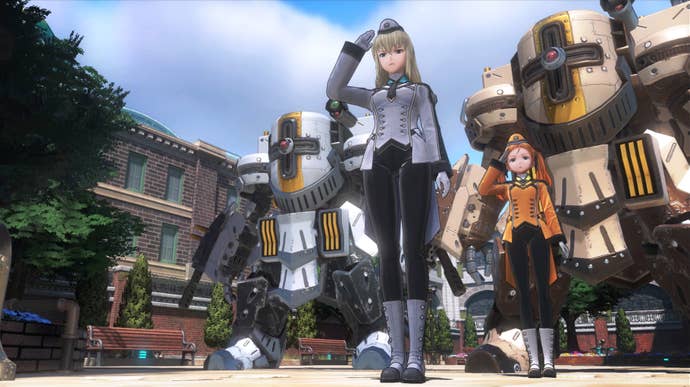
It's a smart switch to put a competitive spin on the demon-slaying. All the other teams from London, Shanghai, and Berlin are arrogant and insulting in equal measure, constantly demeaning the troupe you're desperately trying to build up. The will to punch them in their mech-mouths is an effective force in establishing a lasting bond between you and your teammates.
As I mentioned above, the Sakura Wars series has a surprisingly storied history, and this new game acknowledges that fact early and often. Collectible "Bromides" showcasing key events from past games are scattered throughout; bearing a charming artistic resemblance to the beautiful anime era of Lupin the Third or the original Evangelion. The stylish Bromides are a lovely tribute to a series that many western anime fans are likely discovering for the first time, and they piqued my interest in the entries that came before our current cast of characters commandeered the Imperial Combat Revue.
Sakura Wars's biggest strength, ultimately, is that it's so easily digestible. For all the overarching anime tropes defining them, Sakura Wars' characters are a pleasant bunch to defend Tokyo with. I've enjoyed my time with Sakura, Hatsuho, Anastasia, Azami, and Clarissa in equal measure, even if the actual story and plot developments never evolves them into anything more than fun characters to be around. Sakura Wars' combat is pretty basic, but it does a nice job of punctuating its more plot-heavy moments of expositional storytelling. It might not be an entirely memorable story, and Sakura Wars' characters aren't allowed to evolve much outside of their dedicated vignettes, but it's an enjoyable adventure while it lasts.
ConclusionSakura Wars features a loveable cast of characters and pleasantly easy mech hack-and-slash combat. However creepy and decidedly overbearing the romantic sections of Sakura Wars are, the cutesy characters make this game what it is: a simplistic but enjoyably stylish romp around Tokyo. It's not going to be a memorable tale, but this Sakura Wars is an enjoyable adventure while it lasts.
